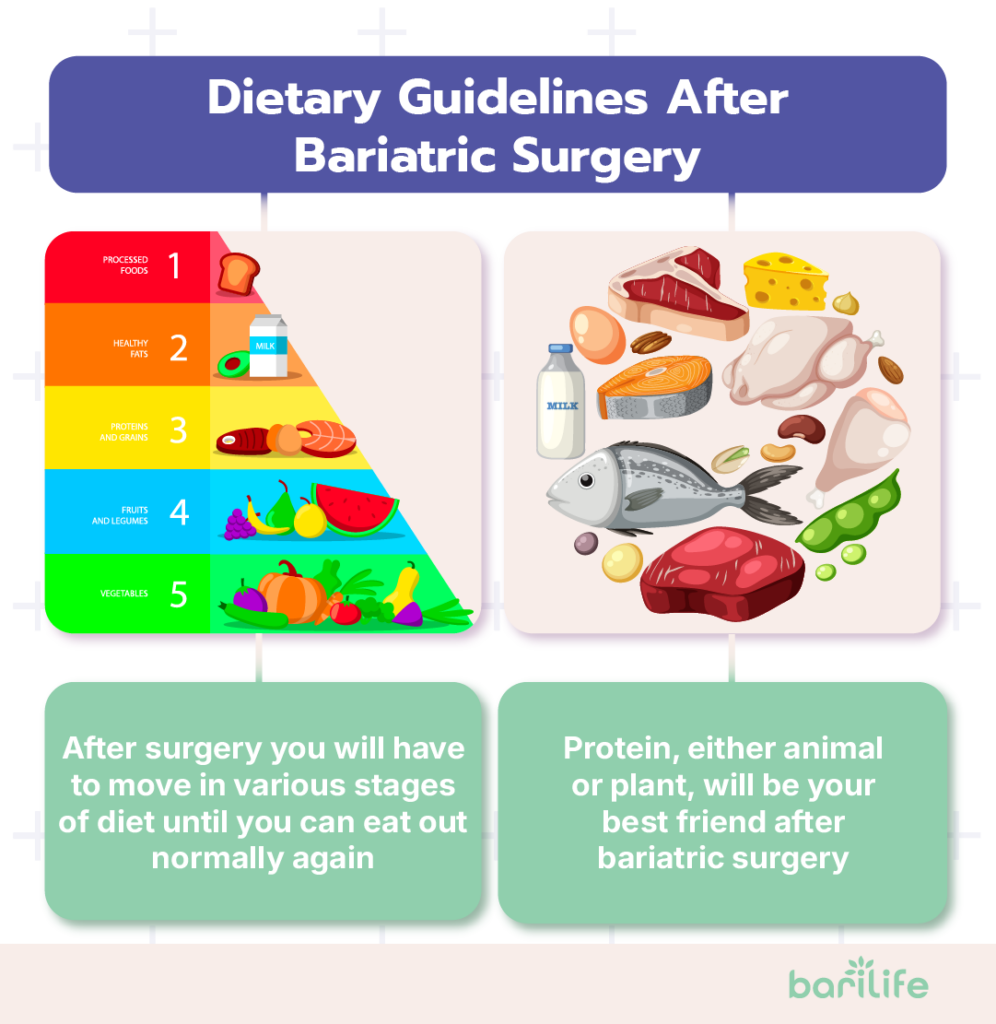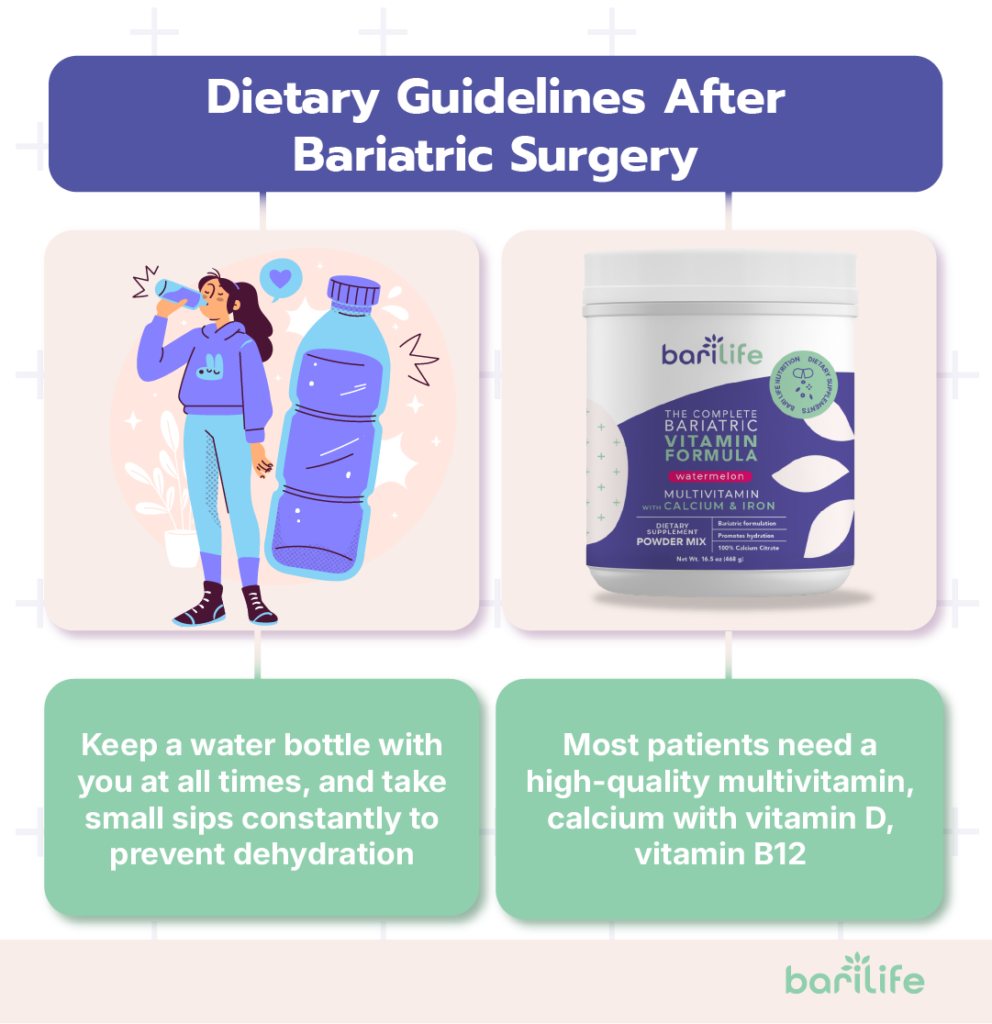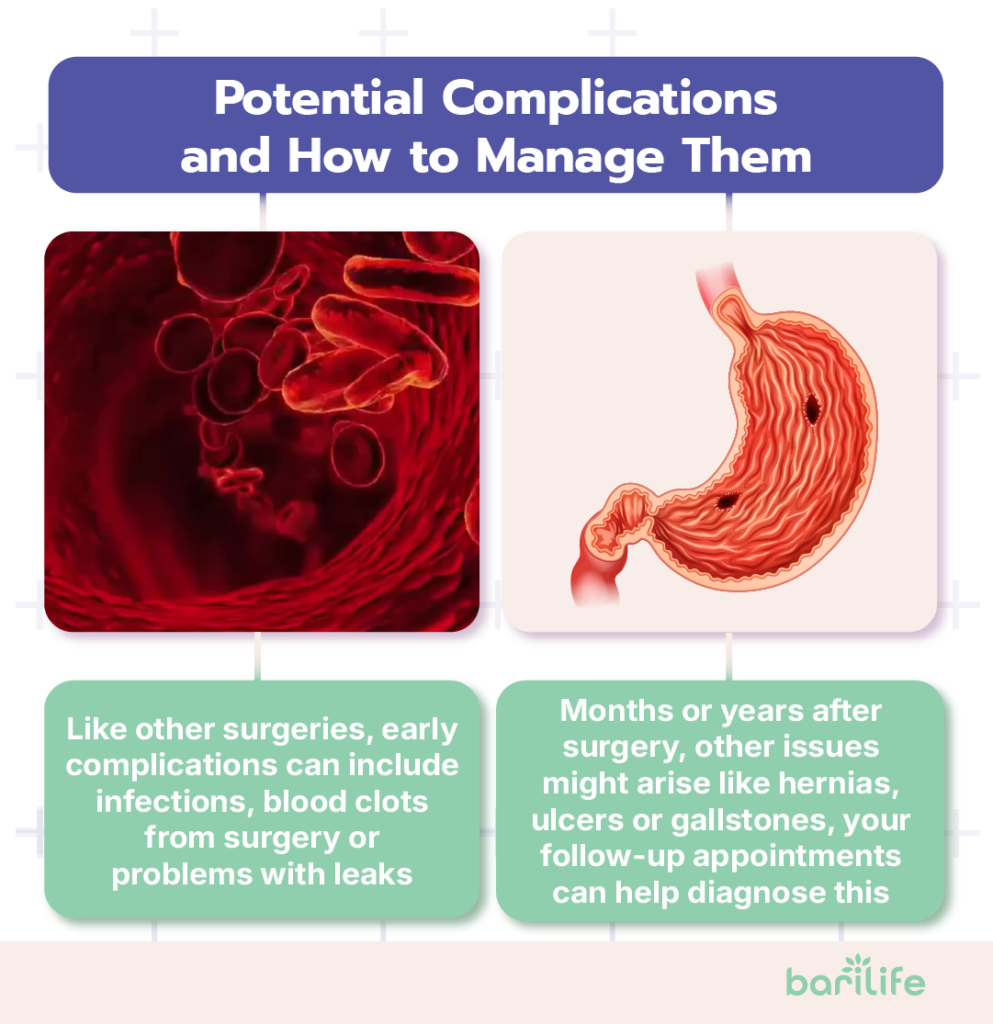Key Takeaways:
- Bariatric surgery is just the beginning—maintaining long-term success requires permanent changes to your diet, exercise habits, and relationship with food.
- Proper nutrition is critical after surgery, with high protein intake (60-100g daily) and lifelong vitamin supplements being essential to prevent deficiencies.
- Regular follow-up care with your medical team and connecting with support groups significantly improve your chances of keeping the weight off permanently.
You've finally undergone bariatric surgery, but now you might be wondering what happens next. What is post-bariatric surgery life really like? How do you make sure all the effort pays off in the long run?
The truth is that bariatric surgery is just the beginning. It's a powerful tool, but the real work starts during your recovery and continues throughout your life. Let's talk about what to expect after bariatric surgery and how you can set yourself up for lasting success.
[/box]
Immediate Post-Surgery Recovery

Those first few days and weeks after bariatric surgery are a crucial time for healing. Here's what you can typically expect:
Hospital Stay
Most people must stay in the hospital for about one to three days after bariatric procedures. This gives your medical team time to monitor your initial recovery and make sure you're stable before heading home. If you had open surgery rather than laparoscopic, you might need to stay a bit longer.
During your hospital stay, you'll be encouraged to get up and walk around as soon as possible after surgery. This might seem difficult, especially when you're still feeling sore, but moving helps prevent blood clots and gets you on a good start to your recovery.
The bariatric surgery recovery time varies by person and procedure, but many people start feeling more like themselves after 2–4 weeks.
Common Symptoms
The first weeks of bariatric post-op recovery can be challenging. Common symptoms you may feel include:
- Fatigue
- Nausea
- Vomiting
- Trouble sleeping
- Pain around incision sites
- Weakness
- Feeling light-headed.
- Poor appetite
- Changes in bowel habits
- Gas pains
Don't worry, these symptoms are normal parts of recovery. Your body is adjusting to major changes, and things get better with time.
Many people also experience emotional ups and downs after surgery. One day, you might feel excited about your new beginning, and the next, you might feel overwhelmed or even regret your decision. These emotional fluctuations are completely normal.
Pain Management
You'll likely have some pain at your incision sites. Your doctor is going to prescribe medications to relieve this discomfort. Take them as directed, but remember that you'll eventually need to transition off narcotic pain medications to over-the-counter pain medication, such as acetaminophen (Tylenol).
The pain should gradually decrease as you recover. If it suddenly gets worse, tell your doctor right away.
Dietary Guidelines After Bariatric Surgery
One of the biggest adjustments after bariatric surgery is your diet. Your eating habits will change dramatically, and following the recommended progression is crucial for proper healing and long-term success.

Diet Progression
After bariatric surgery, you'll go through several dietary stages:
First, you'll start with clear liquids for a few days. This includes water, broth, sugar-free popsicles, and similar items. This phase helps keep you hydrated while your stomach begins healing.
Next comes the pureed food stage, which usually lasts 2-4 weeks. Think baby food consistency—everything should be smooth with no chunks. Protein shakes are also a big part of this stage.
Then, you'll transition to soft foods for another few weeks. This includes easy-to-chew foods like scrambled eggs, soft-cooked vegetables, and tender meats.
Finally, about 8-10 weeks after bariatric surgery, you'll be able to eat regular foods again—but with a whole new approach. Your portion sizes will be much smaller, and you'll need to be very mindful of what you eat.
During this time, you might wonder, “Why are you not allowed to use a straw after bariatric surgery?” The reason is that straws can cause you to swallow air, which can lead to gas, bloating, and discomfort in your smaller stomach pouch.
Protein Intake
Protein is going to be your best friend after bariatric surgery! You'll need to consume between 60 to 100 grams of protein daily to avoid muscle loss and promote healing. This can be challenging with your smaller stomach, which is why many people use protein shakes, especially in the early stages.
Good sources of protein include:
- Eggs
- Lean meats like poultry and fish
- Dairy products (if tolerated)
- Plant-based options like tofu
Hydration
Staying hydrated is super important, but also tricky after a bariatric procedure. You can't drink with meals anymore. You'll need to wait 30 minutes before eating and 30-60 minutes after. It’s also crucial not to gulp large amounts at once.
Instead, sip small amounts throughout the day—try to take at least 64 ounces of fluid daily. Keep a water bottle with you at all times, and take small sips constantly to prevent dehydration.
Supplements
After bariatric surgery, your body can't absorb nutrients as effectively, especially if you had a malabsorptive procedure like a gastric bypass. That means you'll need to take vitamins and minerals every day for the rest of your life.

Most patients need a high-quality multivitamin, calcium with vitamin D, vitamin B12, and possibly iron or other supplements based on their specific needs. These are essential for preventing serious health problems down the road.
Lifestyle Adjustments and Long-Term Changes
While the dietary changes are significant, maintaining your weight loss after bariatric surgery requires broader lifestyle changes, too.
Eating Habits
Beyond just what you eat, how you eat is also important. You'll need to:
- Eat very slowly, taking at least 20-30 minutes for each meal
- Chew thoroughly—aim for 20-30 chews per bite
- Stop eating as soon as you feel full
- Avoid drinking with meals
- Stay away from high-sugar and high-fat foods that can cause dumping syndrome
Regular Monitoring
A successful post-bariatric surgery life includes staying connected with your healthcare team. Regular check-ups allow them to monitor your weight loss, nutritional status, and overall health.
Don't skip these appointments—they're your opportunity to address concerns, get support, and adjust your plan if needed.
Behavioral Changes
The most successful patients make permanent changes to their relationship with food. This could look like:
- Planning meals ahead of time
- Learning healthy cooking techniques
- Finding alternatives to emotional eating
- Developing strategies for social events and restaurants
- Creating new routines that don't center around food
These changes won't happen right away—they're skills you'll develop over time with practice and support.
Physical Activity and Exercise
Movement is a non-negotiable part of long-term success after bariatric surgery.
Gradual Resumption
In the early weeks, walking is your main exercise. But people often ask, “How long after bariatric surgery can I drive?” You can typically drive again once you're off narcotic pain meds and can move comfortably—often within 1–2 weeks.
Other physical activities follow gradually. For instance, “How long after bariatric surgery can you swim?” Most providers recommend waiting at least 3–4 weeks until incisions are fully healed.
Another common consideration is how long after bariatric surgery can I go back to work. The answer depends on your type of job and individual recovery. Many people with desk jobs return in 2–4 weeks, while those with physically demanding roles may need longer. Always follow your surgeon’s advice based on your progress.
Exercise Benefits

Regular physical activity after bariatric surgery does more than burn calories. It helps preserve muscle mass after rapid weight loss, improves cardiovascular health, boosts mood, and increases energy. Exercise also helps prevent weight regain by increasing your metabolism and building habits that support your new lifestyle.
Emotional and Psychological Support
The psychological aspect of bariatric surgery is just as important as the physical changes.
Mental Health
What to expect after bariatric sleeve surgery or any other bariatric procedure includes emotional changes. You might experience:
- Body image adjustments as your appearance changes rapidly
- Changes in how others interact with you
- Identity shifts as you adapt to your new self
- Challenges in relationships with food and eating
Some patients experience "transfer addiction," where food is replaced with another potentially problematic behavior. Others may struggle with depression if weight loss doesn't solve all the problems they hoped it would.
Don't try to handle these challenges alone. Getting help from mental health professionals who know about bariatric issues is important for your overall success.
Support Groups
Connecting with other patients who have gone through what you have can be incredibly valuable. Many successful patients say that support groups were key to their long-term success after bariatric surgery. These communities can offer practical tips, emotional support, and accountability that friends and family (who haven't had the surgery) simply can't provide.
Potential Complications and How to Manage Them
While bariatric surgery is generally safe, understanding potential complications helps you know when to seek help.
Early Complications
In the first few weeks post-op bariatric surgery, watch for signs of:
- Infection: Signs include redness, warmth, increased pain, or discharge at incision sites
- Internal bleeding: Signs include vomiting blood or a bowel movement that's black or tarry
- Leaks from surgical connections: Signs include severe abdominal pain, rapid heart rate, and fever

- Blood clots: Signs include pain, swelling, or warmth in your legs
These complications require immediate medical attention. Don't hesitate to call your surgeon or go to the emergency room if you notice these warning signs.
Late Complications
Months or years after surgery, other issues might arise, including:
- Internal hernias: A condition where the intestines twist or move into abnormal spaces, potentially causing blockages.
- Ulcers: Sores that can develop in the stomach or small intestine, often related to irritation or certain medications.
- Dumping syndrome: A reaction to certain foods, especially sugar or fat, where food moves too quickly through the digestive tract, causing uncomfortable symptoms.
- Gallstones: Hard deposits that form in the gallbladder, often triggered by rapid weight loss after surgery.
- Excess skin: Loose or sagging skin that can result from losing a significant amount of weight quickly.
Always go to your follow-up appointments to catch these issues early when they're easier to treat.
Nutrient Deficiencies
Without proper supplementation, post-bariatric patients risk developing serious vitamin and mineral deficiencies. These can lead to problems like anemia, bone loss, neurological issues, and more.
Follow-Up Care and Monitoring
Your relationship with your bariatric team doesn't end after surgery. Ongoing care is essential for long-term success.
Regular Appointments
Most bariatric programs schedule follow-up visits at specific intervals—often at one week, one month, three months, six months, and one year post-surgery and annually

Leave a Comment
Your email address will not be published.